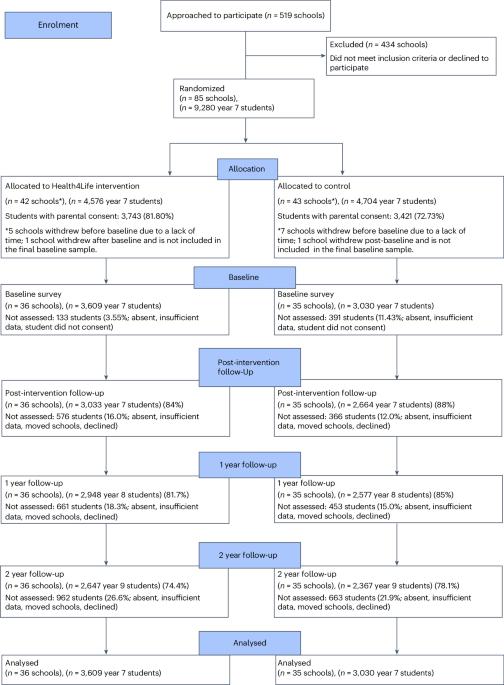Anxiety, depression and distress outcomes from the Health4Life intervention for adolescent mental health: a cluster-randomized controlled trial
IF 8.7
引用次数: 0
Abstract
Mental disorders are a leading cause of disease burden worldwide. As onset typically occurs in adolescence, prevention during this period is critical. The Health4Life-school-based multiple health behavior change (MHBC) intervention targets six lifestyle risk factors: diet, sleep, physical activity, screentime, alcohol use and smoking. Health4Life has been evaluated in a cluster-randomized controlled trial in 71 Australian schools (6,639 grade seven students). This study presents intervention effects on secondary outcomes of depressive, anxiety and psychological distress symptoms. Generalized linear mixed-effect analyses of data from baseline, post-intervention (7 weeks), 12 months and 24 months showed that the Health4Life intervention was no more effective than an active control in reducing depressive, anxiety or psychological distress symptoms at a 24 or 12 month follow-up; however, there were short-term benefits for psychological distress and depressive symptoms immediately post-intervention. This study offers new evidence that multiple health behavior change interventions may improve adolescent mental health, but future research should explore methods to address anxiety and sustain effects over the longer term. A priori ANZCTR trial registration: ACTRN12619000431123. The authors present the secondary outcomes from a cluster-randomized controlled trial of the Health4Life multiple health behavior change intervention. The intervention showed short-term benefits for distress and depressive symptoms but was not more effective than an active control condition.

针对青少年心理健康的 Health4Life 干预措施产生的焦虑、抑郁和苦恼结果:分组随机对照试验
精神障碍是造成全球疾病负担的一个主要原因。由于通常在青春期发病,因此在这一时期进行预防至关重要。Health4Life - 基于学校的多种健康行为改变(MHBC)干预措施针对六种生活方式风险因素:饮食、睡眠、体育活动、屏幕时间、饮酒和吸烟。Health4Life在澳大利亚71所学校(6639名七年级学生)进行了分组随机对照试验评估。本研究介绍了对抑郁、焦虑和心理困扰症状等次要结果的干预效果。对基线、干预后(7周)、12个月和24个月的数据进行的广义线性混合效应分析表明,在24个月或12个月的随访中,Health4Life干预在减少抑郁、焦虑或心理困扰症状方面并不比积极对照组更有效;但是,干预后心理困扰和抑郁症状立即得到了短期改善。这项研究提供了新的证据,证明多种改变健康行为的干预措施可以改善青少年的心理健康,但未来的研究应该探索解决焦虑问题的方法,并将效果维持更长的时间。先验ANZCTR试验注册:ACTRN12619000431123。作者介绍了Health4Life多种健康行为改变干预的分组随机对照试验的次要结果。该干预措施在短期内改善了患者的痛苦和抑郁症状,但并不比积极对照组更有效。
本文章由计算机程序翻译,如有差异,请以英文原文为准。
求助全文
约1分钟内获得全文
求助全文

 求助内容:
求助内容: 应助结果提醒方式:
应助结果提醒方式:


